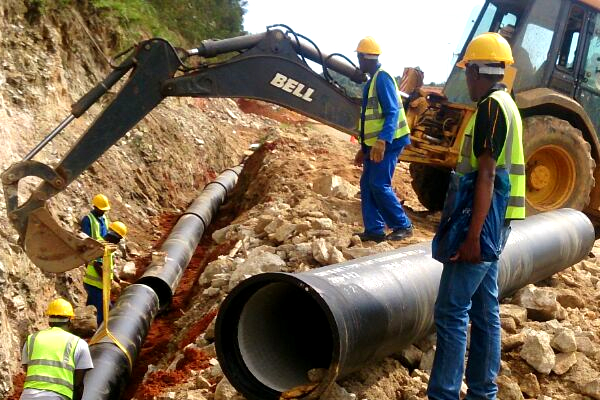 The drinking water that is supplied by EWSC comes from either surface water or ground water. Surface water collects in streams, rivers and dams. Ground water is water located below the ground where it collects in pores and spaces within rocks and in underground aquifers. EWSC obtains ground water by drilling wells and pumping it to the surface where it is then treated similarly to surface water using conventional water treatment methods. EWSC operates 24 water treatment plants which are scattered across the country within our service areas.
The drinking water that is supplied by EWSC comes from either surface water or ground water. Surface water collects in streams, rivers and dams. Ground water is water located below the ground where it collects in pores and spaces within rocks and in underground aquifers. EWSC obtains ground water by drilling wells and pumping it to the surface where it is then treated similarly to surface water using conventional water treatment methods. EWSC operates 24 water treatment plants which are scattered across the country within our service areas.
Safe drinking water is a vital nutrient for human health. The presence of certain contaminants in water can lead to health issues, such as gastrointestinal illness, reproductive problems, and neurological disorders. Infants, young children, pregnant women, the elderly, and people with deficient immune systems may be especially at risk of falling sick after drinking contaminated water. At EWSC we strive to ensure that the drinking water supplied from our systems is safe for consumption. This is done by implementing the following:
EWSC uses various media to engage stakeholders and also to educate the general public on the importance of preventing source water pollution as such does not only have adverse effects on aquatic biodiversity but can also be harmful to downstream consumers who use the water bodies to draw water for domestic purposes. After water has been abstracted from the source, SWSC then treats the raw water using conventional water treatment methods with each treatment process customized for the nature of the raw water and the amount of water produced. It is worth mentioning that to improve process performance whilst also ensuring the safety of our employees and the environment, some of the treatment plants are already implementing various ISO management standards such as ISO 9001, ISO 14001 and ISO 18001.

To maintain the integrity of the treated water from EWSC’s treatment plants to the end user, EWSC regularly cleans and repairs the pipelines and reservoirs and this may account to some of the supply disruptions which consumers may experience however we strive to ensure that consumers are notified through media at least 48hrs before planned maintenance is conducted.
Tests on the quality of the water supplied to consumers are also regularly conducted by EWSC’s ISO 17025 Accredited Laboratory, which is independent of the production process. Regular tests conducted on the drinking water include Total coliforms, Escherichia coli, turbidity, pH, hardness, various anions & cations, etc. If you are interested in knowing more about the EWSC drinking water quality in your area you can call the EWSC Toll free number (8005000) for assistance.
A change in the water’s taste, colour or smell is not necessarily a health concern. An example is when water has excessive dissolved oxygen – it will appear milky and might even have a slightly different smell compared to the familiar smell of dissolved chlorine. However, at times the changes can be a sign of problems. If you do notice a change in your water supply, do contact our 24-hr Call Centre Toll free line (8005000).
In the event EWSC realizes that there is a widespread drinking water quality problem, e.g. waterborne disease breakout, we will notify EWSC water consumers of the risk through the media and also advise on the appropriate mitigations that consumers can take before consuming the water, e.g. boiling the water.
